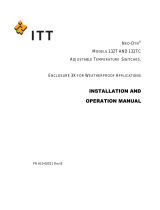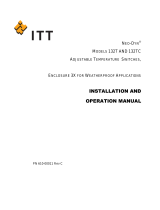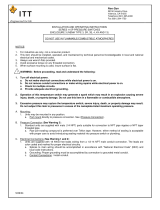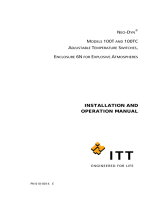Page is loading ...

NEO-DYN
MODELS 132T AND 132TC
ADJUSTABLE TEMPERATURE SWITCHES;
ENCLOSURE 6N FOR EXPLOSIVE ATMOSPHERES
INSTALLATION AND
OPERATION MANUAL
PN 610-0013 Rev E

Enclosure 6N Temperature switchesPage i
Manual No. 610-0013 REV E
Neo-Dyn
®
28150 Industry Drive
Valencia, CA 91355
Tel: (661) 295-4000
Fax: (661) 294-1750
World Wide Web: www.neodyn.com
©Copyright 2002
ITT Industries
Important Information
The product warranty applicable to this ITT Neo-Dyn
®
instrument is as stated on the last page
of this manual.
Should any after-delivery problems arise, please contact ITT Neo-Dyn’s Customer Service
using the information above. Our normal business hours are weekdays, 7:00 am to 3:30 PM,
Pacific Time.
Before installing this Temperature switch, become familiar with the installation and
adjustment instructions in Chapters 2 and 3
WARNING Indicates a hazard which can cause severe personal injury, death, or substantial
property damage if the warning is ignored.
CAUTION Indicates a hazard which will or can cause minor personal injury or property damage if the
caution is ignored.
SPECIAL CONDITIONS
FOR SAFE USE
The electrical snap switch assemblies shall be installed such that the equipment wiring is
protected from mechanical damage by the use of metal conduit or a method providing
equivalent protection. The equipment wiring must not be subjected to tension or torque. If it is
to be terminated within a potentially explosive atmosphere, a suitably certified termination
facility must be used.
NOTE Indicates additional information about a particular item necessary to the operation of the unit.
This document contains proprietary information, which is the property of Neo-Dyn
®
, a unit of
ITT industries. This document may not be reproduced, either in part or in full, without the
consent of ITT industries.

Enclosure 6N Temperature switchesPage ii
TABLE OF CONTENTS
CHAPTER 1 INTRODUCTION ............................................................................................................ 1
CUSTOMER SERVICE .................................................................................................................... 2
OTHER CONFIGURATIONS .......................................................................................................... 2
CHAPTER 2 INSTALLATION ............................................................................................................. 3
MOUNTING ..................................................................................................................................... 3
PROCESS CONNECTIONS ............................................................................................................. 4
PROCESS MEDIA ............................................................................................................................ 4
POTENTIALLY EXPLOSIVE ATMOSPHERES (HAZARDOUS LOCATIONS) ...................... 5
ELECTRICAL CONNECTIONS...................................................................................................... 5
CHAPTER 3 ADJUSTMENTS AFTER INSTALLATION .................................................................. 6
SETPOINT ADJUSTMENT ............................................................................................................. 6
CHAPTER 4 TROUBLESHOOTING ................................................................................................... 8
CHAPTER 5 SPECIFICATIONS .......................................................................................................... 9
WARRANTY INFORMATION .......................................................................................................... 12

Enclosure 6N Temperature switchesPage 1
CHAPTER
1
INTRODUCTION
The Neo-Dyn
®
Enclosure 6N Temperature Switches described in this manual are weather
and explosion-proof, electromechanical sensing devices designed for a wide range of
applications in pneumatic and hydraulic systems up to 1500 psig, and for use in Zone 1
Potentially Explosive Atmospheres (Division 1 hazardous locations). Models 132T and
132TC differ in that the temperature sensor of Model 132T is directly attached to the
housing, while the sensor of Model 132TC is remotely located at the end of a capillary
connection.
Both models use austenitic corrosion-resistant steel (300 series) in the area wetted by the
process media. Model 132T has a Teflon seal, and Model 132TC uses a graphite-filled non-
asbestos packing.
Setpoint adjustments of both models are easily made through the adjustable range by
turning an adjustment nut that is accessed by removing the unit’s front cover.
The standard configuration of these switches will switch up to 11 amp at 125 or 250
VAC, 5 amp resistive at 28 VDC, or 0.5 amp resistive at 125 VDC. When ordered with
M Option, the switch is rated for currents to one ampere, but its bifurcated gold contacts
will reliably switch currents in the milliampere and microampere ranges.
These switches have CE Mark; and the internal switching elements are recognized
components by both UL and CSA. The weatherproof enclosures are rated for IP66
ingress protection, and they also meet the requirements of NEMA 3. 3R, 3S, 4, 4X and 13.
The electrical subassemblies are listed by UL and CSA.

Enclosure 6N Temperature switchesPage 2
Figure 1. Models 132T and 132TC Enclosure 6N
Adjustable Temperature Switches for Explosion Proof Applications
Chapter 5 contains complete specifications.
CUSTOMER SERVICE
If you have any questions about these Pressure and Temperature Switches that are not
covered in this manual, you can contact Neo-Dyn
®
or our representatives in several ways.
The Neo-Dyn
®
customer service phone number is (661) 295-4000. Our customer service
department is open from 7:00 am to 3:30 p.m. Pacific Time.
Our Internet site is www.neodyn.com; it includes lists of sales representatives and
distributors.
OTHER CONFIGURATIONS
WARNING The models described in this manual are also available in special and factory-set
configurations. For these units, follow the installation and operating instructions herein,
except adhere to the pressure, temperature and electrical limits marked on the units.
PROCESS
CONNECTION
1/2-14 NPT MALE
(AT END OF CAPILLARY
ON MODEL 132TC)
2 MOUNTING HOLES
ADJUSTMENT COVER
1/2 in NPT
CONDUIT
FITTING
18 in (46 cm)
FREE LEADS
18 AWG STD
5.92 in Max
(150.4 mm)
2X 1.50 in
(38.1 mm)
TEMPERATURE SENSOR

Enclosure 6N Temperature switchesPage 3
CHAPTER
2
INSTALLATION
Installation of these Neo-Dyn
®
Enclosure 6N temperature switches is straightforward.
However, they must be installed by a qualified electrician, in compliance with all local
and national electrical codes.
WARNING Electrical hazard
WARNING Do not make electrical connections while power is on.
WARNING Always check for multiple circuits.
WARNING Always make sure grounding is adequate.
WARNING Do not remove switch while under pressure.
MOUNTING
Model 132T Temperature Switches can be mounted directly to the process connection if
there is no significant vibration and the fluid lines are capable of supporting the weight,
and it can also be attached to a flat surface, such as a wall or panel, using .190 in.
diameter (no. 10) or M5 fasteners through the mounting holes that are spaced 1.125 in
(28.6 mm) apart. The fastener length should include 1.50 inches (38.1 mm) above the
mounting surface.
Model 132TC, which has a remote temperature sensor, must be attached by the mounting
holes to a flat surface as described above.

Enclosure 6N Temperature switchesPage 4
PROCESS CONNECTIONS
The process connections are:
Model 132T: ½” - 14 NPT male standard. The .25 in. (6.4 mm) dia. temperature probe
extends 3.5 in. (89 mm) past the end of the pipe thread.
Model 132TC: ½” - 14 NPT male standard. The .38 in. (9.7 mm) dia. probe extends 4.25
in. (108 mm) min. from the end of the pipe thread, and can be extended an additional 9.5
in. (241 mm). After this length adjustment, torque the gland nut in the pipe fitting to 230 ±
20 in-lb (26.0 ± 2.3 newton-meters)
When installing the Temperature switch, always:
Make sure that the unit and your system have matching threads.
Use the wrench flats provided.
Seal all joints with pipe joint sealing compound.
CAUTION Avoid excessive torque on all threaded connections.
WARNING Do not exceed the 1500 psig (103.5 bar) maximum operating pressure in normal
operation.
WARNING Do not use as a safety device.
The 2250 psig (155.1 bar) Proof Pressure is provided to give the maximum allowable
pressure without causing permanent damage to the temperature switch in the event of an
over-pressure condition. Set pressure relief/safety valves below this setting.
Similarly, the marked Proof Temperature is the maximum temperature the process media
could reach in an over-temperature condition without damaging the switch. The gland nut
seal on the 132TC model series is NOT designed for pressurized service above 500 °F. As
such, a thermowell is required when media temperatures can exceed 500 °F
PROCESS MEDIA
Process media must be compatible with the wetted materials listed in Chapter 5.
Compatibility is defined by an “A” rating in the Chemical Resistance Guide for Metals
and Alloys, the Chemical Resistance Guide for Plastics, and the Chemical Resistance
Guide for Elastomers, all published by Compass Publications, and available from the
National Association of Corrosion Engineers (NACE), Houston, Texas; telephone 281
228 6200.

Enclosure 6N Temperature switchesPage 5
POTENTIALLY EXPLOSIVE ATMOSPHERES
(HAZARDOUS LOCATIONS)
Suitable for Zone 1, Ex db IIC explosive atmospheres, in accordance with Potentially
Explosive Atmospheres Directive 2014/68/EU (ATEX)
Suitable for Division 1; Class 1, Groups A, B, C and D; Class II, Groups E, F and G
hazardous locations, in accordance with the National Electric Code (NEC), and
applicable UL, CSA, FM, INMETRO specifications.
ELECTRICAL CONNECTIONS
18 AWG free leads 18 in (46 cm) long are standard, with a green wire grounded to the
case. 72 inch (183 cm) leads are available as R Option, and other lead lengths may be
ordered as special configurations. The leads are intended for installation in conduit
capable of withstanding possible explosion pressures, and the leads are factory sealed.
WARNING All field wiring must comply with requirements of the NEC or applicable local or
national electrical codes, including wire gauges and insulation temperature ratings.
Figure 2. Temperature Switch Schematics Shown
Below the Decreasing Setpoint

Enclosure 6N Temperature switchesPage 6
CHAPTER
3
ADJUSTMENTS AFTER INSTALLATION
The factory-set setpoint or adjustable setpoint range is marked on the nameplate of the
switch. This section describes the adjustments needed after an Adjustable Temperature
switch has been properly installed.
SETPOINT ADJUSTMENT
WARNING Do not remove switch while under pressure.
1. Disconnect the electrical power. Check for multiple circuits.
2. Loosen the screws on the adjustment cover and pivot it out of the way.
3. Rotate the adjustment nut by hand or with a small-shafted screwdriver or similar tool
inserted into a slot. The range scale is intended to be used only as an approximate
guide; it indicates the increasing setpoint. Make precise final adjustments using the
measurements described in para 4 and 0 above.
4. To check the increasing setpoint of a temperature switch, insert the temperature probe
into a fluid bath so that the hex is within 3/8 inch (9.5 mm) of the surface, and also
insert a calibrated thermometer into the fluid next to the probe. Slowly increase the
temperature of the fluid (try not to exceed 5 °C or 9 °F per minute) until actuation is
noted by listening to the audible snap of the Belleville spring, or with an ohmmeter
across the appropriate free leads
5. If you want to check the decreasing setpoint, slowly decrease the temperature after
the switch has actuated and note the value at which the audible snap or an ohmmeter
indicates deactuation. Deadband may be calculated if desired by subtracting the
decreasing setpoint reading from the increasing setpoint reading.

Enclosure 6N Temperature switchesPage 7
C
A
U
T
I
O
N
6. Replace the cover by swinging it back into position over the adjustment window and
tightening the screws until the cover is snug against its gasket. Do not overtighten, as
this could damage the gasketIf you want to check the decreasing setpoint, slowly
decrease the pressure or vacuum after the switch has actuated and note the value at
which the audible snap or an ohmmeter indicates deactuation. Deadband may be
calculated if desired by subtracting the decreasing setpoint reading from the
increasing setpoint reading.
CAUTION

Enclosure 6N Temperature switchesPage 8
CHAPTER
4
TROUBLESHOOTING
In-service problems are unlikely, but the following paragraphs suggest ways to verify any
problems that might arise:
1. Failure to Switch
If application of temperature 10% greater than the adjusted setpoint fails to produce
actuation, first check for contamination in the process connection, and verify that the
expected temperature is reaching the sensing diaphragm or piston.
If the Belleville spring can be heard to audibly snap, but an ohmmeter indicates no
electrical switching, the cause is probably stuck or burned switch contacts, or the
switch element has moved away from the position where it was synchronized with
the snap action. Return the unit for repair.
If application of temperature 10% greater than the adjusted setpoint fails to produce
an audible snap of the Belleville spring, there is probably a mechanical failure or
binding due to contamination. Return the unit for repair.
2. Calibration Shifts
If it is suspected that the setpoints have shifted, recheck them per Chapter 3. If you
verify unstable or drifting setpoints, return the unit for repair.

Enclosure 6N Temperature switchesPage 9
CHAPTER
5
SPECIFICATIONS
This section shows standard specifications and available options.
STANDARD
Interface
Model 132T weighs approximately 20 ounces (0.6 kg) each with an aluminum-alloy
body, while Model 132TC weighs approximately 28 ounces (0.8 kg).
Process and Conduit Connections: ½” - 14 NPT male
Part Number
The part number contains information about which configurations and options are
included in your Adjustable Temperature switch. To determine the temperature range,
electrical rating, and options, compare the part number of your unit with the information
in Figure 3 the following tables.
Figure 3. Part Number Breakdown
NOTE: Part number format varies for specials.

Enclosure 6N Temperature switchesPage 10
Wetted Materials
Table 1
No
Description
4
300-series CRES port and piston, Teflon seal, and nitrile O-ring
(Models 132T)
5
UNS S31600 CRES port and diaphragm, heliarc welded (Model
132TC).
Pressure Ratings - Model 130P
Maximum Operating Pressure: 1500 psig (103.5 bar)
Proof Pressure: 2250 psig (155.1 bar)
Listing Agency Approvals
Switch Subassemblies UL, FM, CSA, IECEx, ATEX, INMETRO listed
All models: CE Mark with option N included for most models.
Weather Proof Ratings
Ingress protection IP66
Enclosure type 3, 3R, 3S, 4, 4X, 13 (NEMA)

Enclosure 6N Temperature switchesPage 11
Electrical and Ambient Temperature Ratings
Minimum ambient temperature is -40 °C (-40 °F),
except with B Option and Kalrez O-rings it is -26°C (-15°F)
Form C6N (SPDT):
11 amp @ 125 or 250 VAC to +70 °C (+158 °F) max, T5;
11 amp @ 125 or 250 VAC to +60 °C (+140 °F) max, T6;
5 amp @ 125 or 250 VAC 5; amp resistive , 3 amp inductive @ 28 VDC; .5 amp
resistive, .04 amp inductive @ 125 VDC to +70 °C (+158 °F) max, T6.
Form CC6N (DPDT):
11 amp @ 125 or 250 VAC to +65 °C (+149 °F) max, T4A;
11 amp @ 125 or 250 VAC to +45 °C (+113 °F) max, T6;
5 amp @ 125 or 250 VAC; 5 amp resistive , 3 amp inductive @ 28 VDC; .5 amp
resistive, .04 amp inductive @ 125 VDC to +70 °C (+158 °F) max, T6.
Form C6MN or CC6MN (SPDT or DPDT with M Option):
1 amp @ 125 VAC to +70 °C (+158 °F) max. T6
OPTIONS
The available options for standard switches are listed below. These options can be
combined; every included option will be indicated in the part number of the unit.
Table 2
Option
Description
A
Epoxy-painted exterior
M
Gold Electrical Contacts For Extremely
Low Current Applications
N
CE Mark, ATEX, IECEx
R
72 inch (183 cm) leads

Enclosure 6N Temperature switchesPage 12
WARRANTY INFORMATION
A. Warranty:
ITT Industries (ITT) warrants that at the time of shipment, the products manufactured by
ITT Neo-Dyn
®
and sold hereunder, will be free from defects in material and
workmanship and will conform to the specifications furnished or approved by ITT.
B. Warranty Adjustment:
If any defect within this warranty appears, the Buyer shall notify ITT immediately.
ITT agrees to repair or furnish a replacement for, but not install, any product which,
within one (1) year from the date of shipment by ITT shall, upon test and examination by
ITT, prove defective within the above warranty.
No product will be accepted for return or replacement without the written authorization
of ITT. Upon such authorization, and in accordance with instructions by ITT, the product
will be returned with shipping charges prepaid by the Buyer. Replacements made under
this warranty will be shipped prepaid.
C. Exclusion from Warranty:
THE FOREGOING WARRANTY IS IN LIEU OF AND EXCLUDES ALL OTHER
EXPRESSED OR IMPLIED WARRANTIES OF MERCHANTABILITY, OR FITNESS, OR
OTHERWISE.
Components manufactured by any supplier other than ITT shall bear only the warranty
made by the manufacturer of that product, and ITT assumes no responsibility for the
performance or reliability of the unit as a whole.
In no event shall ITT be liable for indirect, incidental or consequential damages nor shall
the liability of ITT arising in connection with any products sold hereunder (whether such
liability arises from a claim based on contract, warranty, tort or otherwise) exceed the
actual amount paid by Buyer to ITT for the products delivered hereunder.
The warranty does not extend to any product manufactured by ITT, which has been
subject to misuse, neglect, accident, improper installation, or to use in violation of
instructions furnished by ITT.
The warranty does not extend to or apply to any unit, which has been repaired or altered
at any place other than at ITT’s factory or service locations, by persons not expressly
approved by ITT.
/









